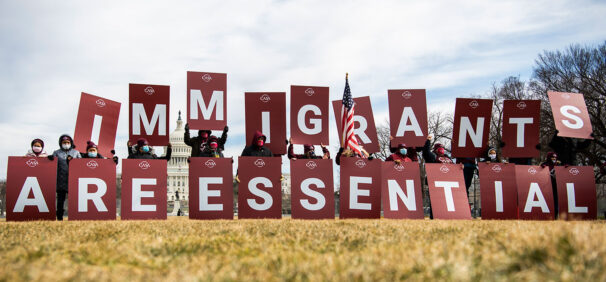
The Biden administration has introduced a sweeping new immigration bill that stands in stark contrast to Donald Trump’s four years of attacks on undocumented workers and their families. The new bill is being seen by many as a bold step in a better direction, but some immigrant rights activists are pointing out shortcomings in the new bill, and the legislation, as it is, has an uphill battle to be passed in Congress.
Officially titled the U.S. Citizenship Act of 2021, Biden’s immigration bill comes on the heels of the new president’s three executive orders centered on immigration issued earlier in the month. Those decrees created a task force to reunite families the Trump administration had split with his border separation policy, temporarily rolled back Trump’s Migrant Protections Protocols program, and reviewed the country’s 1882 public charge rule that allowed the government to deny visas to applicants who are judged as likely to become dependent on government benefits. Also included was an immediate halt in funding for construction of Trump’s border wall.
Biden’s plan appears to put the road to citizenship center stage, while also attempting to address some of the systemic problems of current immigration policy.
A shorter path
The shortened path to citizenship is the centerpiece of the new bill. The legislation would cut five years from the current application process, with undocumented immigrants being able to obtain citizenship in eight years or less, instead of 13. Those who qualify would have to be physically present in the country on or before Jan. 1 of this year.
The Deferred Action on Childhood Arrivals Act (DACA), whose beneficiaries are known as Dreamers, and Temporary Protected Status (TPS), typically aimed at refugees facing dangerous conditions in their home countries, were two programs that Trump continuously attempted to eliminate. If passed, Biden’s bill would immediately give legal status via a permanent resident card, or green card, to those who fall under these programs. They then would be able to apply for citizenship three years later. This exception also applies to undocumented farmworkers.
Close to one million undocumented immigrants and their children are covered under DACA and TPS, with an estimated 2.4 million farmworkers outside of these categories but included in the Biden plan.
Some immigrant advocates argue, however, that this distinction causes an unnecessary inequality among undocumented people who don’t fall under any of these three categories. Those who don’t would have to obtain a work permit and exit the country based on an assurance that they would be permitted to re-enter the United States later. Then, after five years, they could apply for a green card if they pay taxes and pass background checks. Three years after that, they too could then apply for citizenship.
As Gabriel Manrique, a community organizer, told reporters back in January at a car caravan protest in San Jose, Calif., “We have a lot of people who’ve been waiting 10, 20, 30 years for a green card. Most undocumented immigrants can’t apply to the program[s].”
Manrique echoes what many immigrant rights activists are pointing out—that under Biden’s new bill, only a fraction of the 11 million undocumented people would see an immediate impact on their situation.
Still, with fewer roadblocks on the journey to obtain legal status, many undocumented workers might be able to lift the heavy fear of deportation from their shoulders sooner. This goes as well for the fear of being separated from their loved ones.
Changing terminology

Under the Trump administration, people across the country were exposed to pictures of traumatized young children in cages, separated from their parents and guardians. The Biden administration claims that its new bill will reform the “family-based immigration system by clearing backlogs, recapturing unused visas, eliminating long wait times, and increasing per-country visa caps.”
The bill also aims to expand what is considered family in the eyes of the law. Permanent partnerships that are not marriages would be recognized, and there would be a commitment to eliminating the discrimination facing LGBTQ families.
This counter to these forms of discrimination seems to go hand in hand with the change in terminology that Biden’s bill proposes. The legislation would remove the word “alien” from U.S. immigration laws, replacing it with the term “noncitizen.”
For decades, and especially over the past four years, terms like “illegal alien” have been used to create a narrative around undocumented people as the “other,” conjuring images of outside invaders. In the 2016 presidential election, then-candidate Trump made the so-called “crisis” of undocumented people entering the United States a cornerstone of his campaign strategy. With slogans such as “Build the wall” and a narrative that undocumented immigrants were stealing jobs, committing crimes, and driving down the wages of U.S. citizens, Trump entered the White House fueling anti-immigrant hate and disdain.
It would appear Biden is attempting to roll back that narrative. Although it’s arguable that even the term noncitizen falls short, since citizens are required to abide by the law and pay taxes—all things undocumented workers do as well.
Another way to combat the incriminating narrative around undocumented workers would be to address the question of Immigration and Customs Enforcement (ICE)—the department tasked with arresting, detaining, and deporting immigrants. Biden’s bill attempts to do this, but with decidedly mixed results.
Nixing ICE abolition and keeping privately-run detention centers
The creation of ICE, coupled with companies who saw an opportunity to make a profit from the undocumented immigrants ICE detained, created a poisonous mix for human rights violations across the country.
Even in the midst of the current global pandemic, thousands of undocumented people are being kept in detention centers in abysmal living conditions with poor legal resources. According to the American Civil Liberties Union, the average daily detained population has grown from 7,475 in 1995 to 32,985. As of 2016, 73% percent of immigration detention beds were run by private prison corporations. These companies have made billions of dollars, flourishing like never before under the Trump administration, through contracts with the U.S. government. Paid for with taxpayer dollars, the arrangements ensure guaranteed quotas for a minimum number of detainee beds filled each night.
Biden’s U.S. Citizenship Act addresses some of these concerns but still has some glaring omissions.
The bill puts emphasis on access to legal counsel for undocumented immigrants along with proposed funding for more immigration judges. The legislation would also eliminate the one-year limit for filing an asylum case. In addition to this, Biden has already taken steps towards a more “focused” immigration enforcement in the U.S. Under the purview of the Department of Homeland Security, ICE would be directed to focus on people who pose a threat to “national security, border security, and public safety.”
It could be argued that a more targeted approach by ICE could lead to fewer arrests, thus leading to fewer undocumented immigrants detained. But immigrant rights advocates like the ACLU beg to differ.
In a statement on behalf of the organization, spokesperson Naureen Shah called the measures a “disappointing step backward from the Biden administration’s earlier commitments to fully break from the harmful deportation policies of both the Trump and Obama presidencies.” Shah said the president “has chosen to continue giving ICE officers significant discretion to conduct operations that harm our communities and tear families apart.”
And while Biden has ordered the Department of Justice to end its reliance on private prisons, missing from the immigration bill is a banning of privately-run immigrant jails. The White House has even recently come under fire for reopening two previously shuttered for-profit immigrant detention centers. And while many activists have called for a defunding of ICE and DHS, it would appear that Biden’s bill aims to invest more funding into the organization with regard to technology and officer training.
It is clear that the fight still continues for the undocumented who find themselves entangled in the legal system. This fight also extends to those outside of detention centers attempting to make a living in a country that often underpays all of its workers.
Undocumented workers’ rights

There are some promising measures when it comes to the protection of undocumented workers in Biden’s bill. For example, it includes a directive for DHS to work with labor, employer, and civil rights organizations in order to improve the employment verification process. If this legislation passes, it will also protect workers who are victims of workplace retaliation from deportation.
While these measures show promise, they fail to address the millions of undocumented workers in the country who are ineligible to receive financial relief from a global pandemic that has left millions unemployed and in financial uncertainty. This includes undocumented immigrants who have taxes removed from their checks amounting to nearly $120 billion a year but are not allowed to receive stimulus payments or other means of government assistance. Couple this with the already low wages that many undocumented workers are forced to work for, and it’s clear that the U.S. Citizenship Act is only one small step in a tangled web of immigration policy.
The fight continues
The National Day Laborer Organizing Network, which focuses on the conditions faced by migrants, day laborers, and low-wage workers, says that there’s more Biden could do right away even as the bill makes its way through Congress. The group’s initial response has been to tell immigrants rights activists to “hold all applause until the end.”
NDLON’s general counsel Chris Newman said, “because the country is facing unprecedented overlapping emergencies, the Biden administration cannot wait on a broken Congress to reform itself,” referring to debate over the Senate filibuster. He said Biden could issue an executive order forbidding deportation for anyone who will qualify for eventual citizenship under his bill once it passes.
NDLON also wants anyone who will potentially benefit from the work authorization changes in the bill to also be included in COVID-19 relief packages; currently the undocumented are totally left out of them. It says Biden can stop ICE dragnet programs even before the organization is reformed, TPS can be restored to maximum quotas reversed by Trump, and whistleblower programs can be initiated that encourage workers to report employer abuse without fear of retribution based on immigration status.
If nothing else, the discourse around the Biden immigration bill is reminding the nation that immigration reform is a necessity for the progress of everyone who lives in the United States. As the country emerges from the Trump era, it is not only left with the vestiges of his misdeeds but also the legacy of decades of poor immigration policy that has disenfranchised and divided so many. It is not a faceless point to be squabbled over by those on Capitol Hill for political points, but a human rights issue that ripples through all of our communities.











Comments